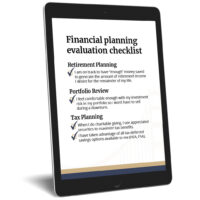
7 principles of bold financial decision making
At The Advisory Group, we believe bold means purposeful, not risky. It means you enable impact on what you care about most. When you make bold, meaningful financial decisions you can live, lead, and give with intention.
Being bold in your financial life doesn't mean betting big. It means making clear, intentional choices based on what matters most. Whether you are an individual, a business leader, or a mission-driven organization, these seven principles can help you act with conviction instead of hesitation.
1. Start with purpose, not products
Bold decisions start by asking why, not what.
- Individuals might be saving and strategizing for a life transition like retirement, supporting children, or planning for a legacy.
- Institutions are often guided by a mission or a mandate, like supporting future generations or sustaining a program and helping employees achieve retirement readiness.
When decisions are aligned with a clear purpose, it becomes easier to filter noise, resist emotional impulses, and stay focused over time.
2. Clarify the time horizon
A bold strategy requires a clear sense of timing, so you know when to act and when to hold steady.
- Short-term needs often prioritize liquidity and flexibility.
- Long-term goals call for patience, risk tolerance, and fitting in with future outcomes.
For institutions, this may mean setting investment policies based on perpetual goals. For individuals, it could mean balancing retirement timelines with life goals, or transitions such as divorce or caring for an aging parent. Time and clarity add context, and context sharpens decisions.
3. Define success before choosing a strategy
Defining success is what transforms a plan into a bold commitment, not just a hopeful projection.
- Institutional example: An endowment might define success as developing a sustainable spending policy that avoids erosion of corpus. Or, helping employees make smart decisions about savings rates and investing.
- Personal example: A family may define success as funding college, retiring at 67, and leaving a charitable legacy.
Without this clarity, you're more likely to miss your goals, chase performance or attempt to avoid volatility risk, only to find that doing so increases goal risk. Defining success guides not just strategy but also behavior.
4. Check for emotional triggers
Bold decision-makers know how to recognize emotion without being ruled by it.
- Fear can lead to paralysis around defining goals, and/or hoarding cash.
- Greed may lead to unrealistic expectations and/or trigger speculative risks.
- Guilt or excitement can cloud judgment.
Endowments and retirement plan sponsors build committees and policies to manage this. Individuals benefit from financial planning and goals-based analysis. All benefit from second opinions, financial coaching, a prudent process, thoughtful decision-making, and documented rationales, all with the help of outside expertise. Emotional awareness is a powerful financial skill especially amid turbulent markets.
5. Use a consistent, disciplined, and thorough process
Discipline is the backbone of bold action. It gives you something to rely on when uncertainty arises.
At The Advisory Group, our expert team and well-designed and prudent processes increase the likelihood of success over time. As such, we follow a 5-step investment process.
Each strategic decision, including investment decisions, fits within the goal framework and investment policy parameters jointly established with you, whether you are a personal wealth client, a company, or a foundation or endowment.
Whether you're a CIO or a couple nearing retirement, having a process reduces decision fatigue and keeps choices aligned with your goals.
6. Seek the right advice. Own the choice
It's bold to ask for help and even bolder to take ownership of that decision.
Good advisors don't just give answers; they help you ask better questions:
- "What tradeoffs am I accepting?"
- "What assumptions am I making?"
- "What don't I see yet?"
Working with a fiduciary advisor means gaining clarity. But that doesn't mean disengaging. At the end of the day, values must come from you. Advice can guide you, but when you take ownership of your future or that of your participants or benefactors, you build confidence and improve outcomes.
7. Revisit decisions as context changes
Bold doesn't mean stubborn. It means staying intentional even as life shifts.
- Life changes. Market conditions evolve. New priorities emerge.
- Institutions may adapt to policy changes, leadership transitions, or new goals.
- Families might welcome a new child, sell a business, or care for aging parents.
Build checkpoints into your plan. Make room for thoughtful adjustments. Re-evaluating decisions doesn't mean you were wrong. It means you're still paying attention.
Bold decisions come from clarity
Bold financial decisions aren't reckless. They're rooted in clarity, values, and long-term vision.
Whether you're stewarding a family's future, employee retirement preparation, or a foundation's mission, the process is the same: define your purpose, set your direction, follow a thoughtful process, and stay in tune and adjust as life unfolds.
If you'd like support applying this kind of clarity and structure to your decisions—whether personal, institutional, or both—The Advisory Group is here to help. We make it easy for you to get the guidance you desire. Reach out to schedule a discovery call with one of our expert advisors today.
The information provided herein is for informative and educational purposes only. The use of hyperlinks to third party websites is not an endorsement of the third party. Third party content has not been independently verified. To understand how this content may apply to you, please contact a financial advisor.





